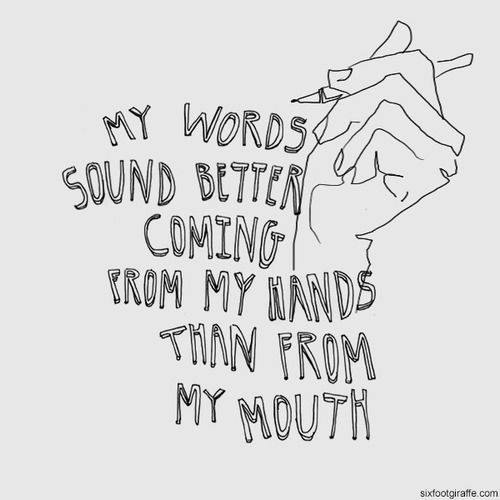Why Introverts Struggle to Speak
I can’t take credit for the below article, but it was so good I had to share it. It’s something I deeply relate to; some of you may too. The original post is here. What do you think?
A co-worker appears out of the blue and asks me a question. Her eyes and tone of voice say she wants an answer now. Her request is easy, but my mind is momentarily paralyzed.
I start sentences then stop them. I hesitate. I say words that are close to what I mean, but not exactly. I backtrack.
My co-worker — an extrovert who always seems to express herself effortlessly — looks at me like, come on, spit it out. I think, if only my brain would cooperate.
Why introverts struggle with word retrieval
When we’re speaking out loud, we introverts often have trouble finding the word we want. We may come off sounding like we don’t know what we’re talking about, even though we probably do. In social situations, we may have trouble keeping up with fast-talking extroverts.
Our brains use many different areas for speaking and writing, writes Dr. Marti Olsen Laney in her book, The Introvert Advantage: Making the Most of Your Inner Strengths. Information needs to flow between the separate areas, and as introverts, we process information deeply, which means it flows slowly.
Word retrieval is a problem for some introverts because, along with deeper processing, we rely on long-term memory more than short-term memory. It takes longer to access long-term memory, and we need the right association (something that reminds us of the word) to reach into our long-term memory and pull out the exact word we want, writes Laney.
If we’re anxious — which may happen when we’re with people we don’t know well, or when we’re in a high-pressure situation like a first date — it may be even more difficult to locate and articulate a word.
Why it’s easier to express ourselves in writing
Introverts “often feel as if they express themselves better in writing than in conversation,” writes Susan Cain in her book Quiet: The Power of Introverts in a World That Can’t Stop Talking.
Introverts often prefer text messages and emails to phone calls. Many of us keep journals or compose lyrics, poems, or stories, and some of us make careers out of writing.
The reason for this preference once again has to do with how our brains are wired: written words use different pathways in the brain, which seem to flow fluently for many introverts, writes Laney.
What to do when your mind goes blank
Memory is complex, and it uses many different areas of the brain. Our brains store memories in several locations and create links between them, called associations.
To yank something out of long-term memory, we need to locate an association. The good thing is, most pieces of information in long-term memory were stored with several associations or keys for unlocking them.
“If we find just one key, we can retrieve the whole memory,” writes Laney.
When you struggle to remember a word, a piece of information, or even what you did over the weekend (because that question often comes up in small talk!), try these things:
- Be still and relax.
- Give yourself permission to be quiet for a few moments. Don’t let the other person rush you.
- Buy yourself time to process things by saying something like, “Let me think about that,” or “Hmm, let me see…” Or, give a nonverbal signal that shows you’re thinking, like looking away and furrowing your brow slightly.
- Let your mind wander for a moment and go where it wants. One thought may lead to another, and one of those thoughts may hold the “key” to unlocking the words you want from your long-term memory.
If all else fails, and words escape you, don’t feel embarrassed — your brain is doing what comes naturally to it, and that is to pause and reflect. If you’re being quiet, you’re in good company with other deep-thinking introverts: Stephen Hawking once said, “Quiet people have the loudest minds.”
Then, try breezing over any awkwardness in the conversation by using humor to make light of your tongue-tied state, or say you’re a little distracted right now, and you’ll get back to the other person later — by sending an email or text.





Add A Comment